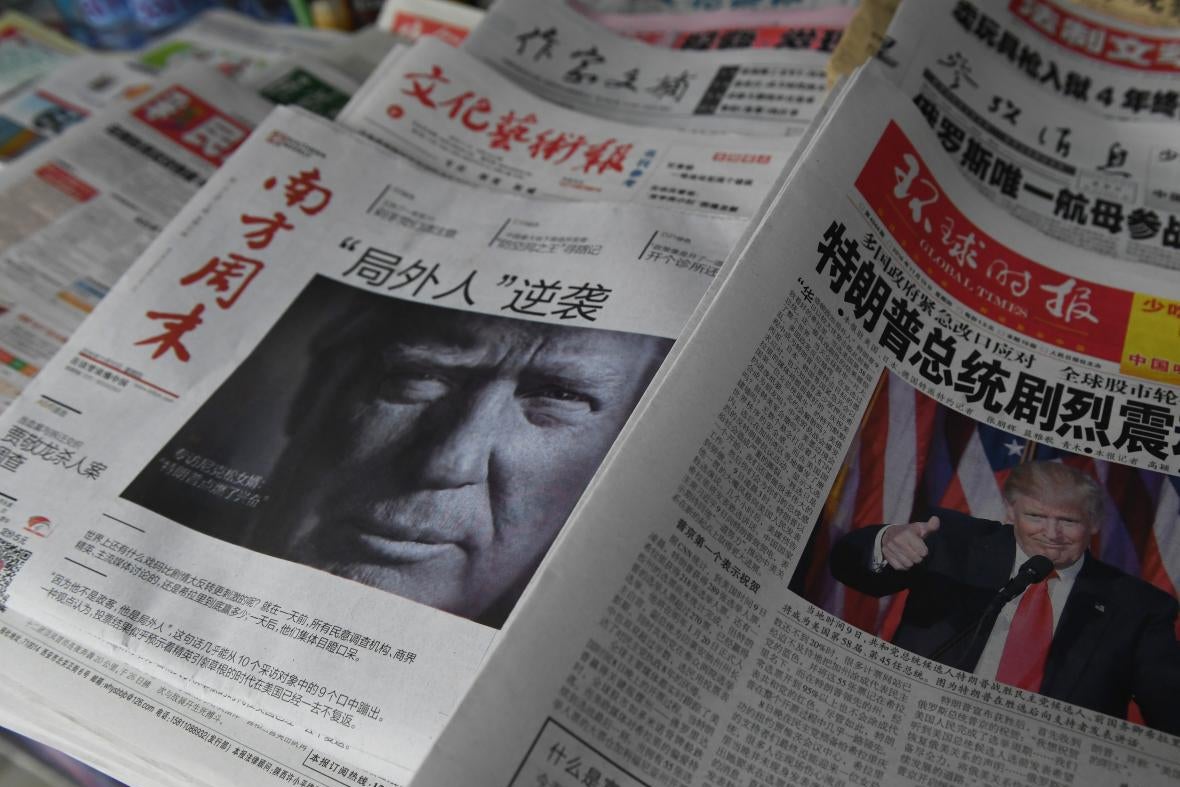One unexpected silver lining of having a president-elect as erratic and uninformed as Donald Trump is that it gives everyone an out when he makes a bad move. Following Friday’s unusual phone conversation between Trump and Taiwanese President Tsai Ing-wen, a possible upending of the “one China” policy the U.S. has maintained since 1979, Beijing filed a diplomatic complaint, but the Chinese foreign ministry also dismissed the call as “just a small trick by Taiwan”—seemingly implying that Trump had been duped into taking the call.
Meanwhile, Trump’s advisers and surrogates spent the weekend implying that the call was either a long-planned deliberate signal to Beijing or just a simple courtesy call that didn’t signal anything. Trump himself seemed halfway between those positions on Twitter, first emphasizing in all caps that Tsai “CALLED ME” to offer congratulations, then later (not entirely accurately) blasting various Chinese policies as self-justification for the call:
The phone call was not, on its own, indefensible. As Trump accurately pointed out, the U.S. already sells a significant amount of military equipment to Taiwan. And the U.S. certainly shouldn’t always concede to Chinese sensitivities when figuring out how to interact with its allies. Like the use of U.S. naval warships last year to assert freedom of movement in the Chinese-claimed South China Sea, if intentional, the call could be a signal that the U.S. will back allies under pressure from Beijing’s territorial ambitions. If we give Trump and his team the benefit of the doubt, they may have assumed China’s backlash would be limited and that such a demonstration would be worth it. Under certain circumstances, it’s not impossible to imagine a President-elect Clinton doing something similar, though her team would hopefully have had a more clear and coherent explanation immediately available for what she had done and why. Trump’s previous suggestions that allies like Korea and Japan need to pay up more for U.S. security guarantees suggests that supporting U.S. pals in their disputes with China is not a major priority for him, but perhaps he had a change of heart.
What would be more worrying is if Trump, who is not taking normal State Department briefings before speaking with foreign leaders, is making changes to U.S. foreign policy on the fly, perhaps not even realizing that he’s doing it. It is hypocritical that the U.S. pretends to believe that Taiwan is just a province of China, while following policies that support its de facto independence, but that’s a hypocrisy that has allowed the U.S. to continue to tacitly back Taiwan while avoiding a confrontation with a nuclear-armed superpower. And, based on prior experience, any president should be aware of the risks of changing course and proceed with extreme caution.
During the 1995/1996 Taiwan Strait Crisis, China staged missile tests around Taiwan after the U.S. allowed then President Lee Teng-hui to give a speech at his alma mater, Cornell. The U.S. responded by deploying aircraft carrier battle groups to the region as a show of force. The situation was resolved eventually, but China’s military is much more powerful now than it was in the ’90s and the risk of catastrophe due to a miscalculation or misunderstanding at a key moment has only increased. The fact that Trump’s first impulse after the uproar over the call was to lash out at critics and at China does not inspire confidence about his ability to defuse tension and get a possibly dangerous situation under control.
Whether the phone call was the result of a power play by China hawks on Trump’s team, Taiwan sensing an opportunity to enhance its standing, Trump’s business interests, or the president-elect not understanding the consequences of what he was doing, or some combination of all four, there’s enough ambiguity here that China will likely let this one slide. Chinese leaders don’t want a military confrontation with the United States. But they certainly aren’t immune from the pressures to save face and demonstrate strength that lead all governments to do dumb things.
I hope that Trump’s advisers really did think this through in advance, keeping in mind the possible consequences. It would be a lot more worrying if they are just retroactively turning an ad lib into a deeply held policy position, as happened numerous times during the campaign.
